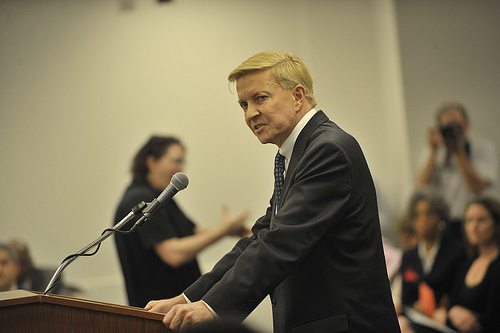
Mayor Rahm Emanuel’s 2014 budget proposal makes “a significant investment in the education, health and safety” of its neighborhoods, but at least two aldermen argued Wednesday the refusal to hire more police officers is detrimental not only to Chicago’s safety but its economy as well.
“Yes, we need a balanced budget, but safety is one of the three or four concerns of a balanced budget,” said Ald. Bob Fioretti (2nd) who represents the South Loop, after a brief City Council meeting Wednesday at City Hall.
Ald. Nick Sposato (36th), representing neighborhoods in the Northwest Side of Chicago, said that it would be more cost efficient to hire new police officers rather than continuing to pay current officers overtime.
“The overtime cops issue is the one I’m worried about,” Sposato said. “There is no way the budget is not going to be approved—but $93 million in overtime is too much. We’re barely keeping up right now.”
The proposed 2014 budget was released several weeks ago, but it’s not scheduled to be voted on until Tuesday’s City Council meeting. The numbers provide “funding for the Chicago Police Department to hire officers to remain at full strength at all times,” according to an Oct. 23 mayoral press release. It does not provide money to increase the police personnel.
This year’s budget allotted $32 million for overtime pay of officers, but the department expects to spend $93 million, according to Adam Collins, director of News Affairs for the Chicago Police Department.
That overrun has Fioretti worried. He said a solution would be to hire a minimum of 1,000 new police officers, but he said he proposed 500 new officers in an amendment to the budget plan.
Daniel Gorman, vice president of Chicago’s Grand Lodge Fraternal Order of Police Union, said paying veteran police officers overtime is twice as costly as hiring new ones. While the upfront hiring of a new officer — $122,000 in the first year for training and pension costs — seems substantial, in the long run it will cost the city less. Gorman said this is more cost effective as the average annual salary of a rookie is $38,000.
Gorman said 9 percent of an officer’s regular salary goes into the pension fund. But when an officer is on overtime, no money goes into the already indebted pension fund.
Collins said it’s the absence of that allocation to the pension fund that actually makes the decision to not hire more officers more economically efficient. For example, the total cost of an overtime shift is $64 a day or $8 per hour, but for an officer on salary it is $83 for one shift, Collins said.
For Fioretti however, the debate on the budget is a matter of safety more so than the money.
“What [overtime] does psychologically, physically, to the [officer’s] individual families, is just unprecedented,” he said.
Fioretti continued: “You can’t make good decisions if you’re tired as a police officer. Police are targets of people and targets of those that don’t have good will. If we’re just reactive and not proactive in our communities, I think that there’s a tacit acknowledgement by this administration that we need more police officers. How do I know that? Because they’re spending so much time in overtime.”













Be First to Comment